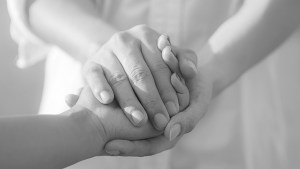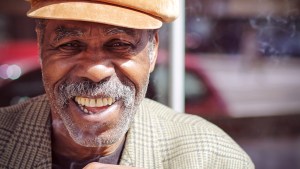On October 2, 2006, Charles Carl Roberts IV, evidently nursing a decades-old grudge, took a group of 11 Amish schoolgirls hostage in a one-room schoolhouse in Nickel Mines, Pennsylvania. He bound them and shot them. Five were wounded. Five died. Then Charles Roberts took his own life.
Roberts’ mother later recalls the anger and pain she felt upon hearing the news of what her son had done. She wrote, “Where were you, God? … You knew what Charlie was going to do … How could you let this happen?”
What followed was just as incomprehensible as the murder of five innocent girls. The Roberts’ neighbor, Henry Stoltzfoos, an Amishman, appeared on the Roberts’ doorstep. When Charlie Roberts’ father opened the door, Stoltzfoos put one hand on his shoulder and declared simply, “Roberts, we love you.”
In an act of unquantified cheek-turning, the area’s Amish families—wracked by unspeakable grief—embraced the Robertses.
Today’s Gospel is a challenge to us all. As passions flail and tempers flare, we are so often quick to desire revenge and slow to offer mercy.
Cheek-turning can also be called sacrificial love. Blessed Isaac of Stella challenges us, putting the question this way, “Why, brothers, are we so little concerned to seek one another’s well-being, so that where we see a greater need, we might show a greater readiness to help and carry one another’s burdens?”
We would do well then to prepare ourselves in order to become better cheek-turners.

Read more:
Aleteia’s Sunday homily: Undertaking the work of forgiveness
First, habitual reflection on Scripture and regular meditation will keep our lives in perspective. If we hope to suddenly be able to pull out of our hearts a God’s-eye-perspective whenever there are five-alarm spiritual fires going on, and we don’t have a constant devotion to prayer, we are kidding ourselves. To turn the other cheek requires charity to flood the soul from the deepest wellsprings. These springs must be tended and kept flowing. Charity must be accrued by dedicating attention to the spiritual life.
In today’s second reading, St. Paul reminds the Corinthians of the importance of recognizing the presence of God as he asks, “Do you not know that you are the temple of God, and that the Spirit of God dwells in you?” This temple must be cared for. It must be nourished by reading the Scriptures and our regular personal prayer.
Cultivating charity must always have the first place. It is charity that unites us to the life of Christ and the riches offered by the Church. Read the Gospels. Reflect on the way Jesus encounters souls. Study the Acts of the Apostles, the extraordinary story of life in the early Church. Read the book of Exodus, the story of the salvation of Israel. Meditate then, and hold fast to what you have read. To rely on those treasures, we must train our minds and hearts with a regular habit of prayer in order to move freely among and according to divine things.
Second, turn the other cheek by walking away. There were more than a few times in the life of Christ where his words raised such protest among the people, that he had to flee for his life (eg. Luke 4:29). Jesus knew the time when things would be brought to fruition; but in those instances where he left, he knew that “his hour had not yet come” (John 7:44).
He encourages his disciples to do the same. Jesus says, “And if any one will not receive you or listen to your words, shake off the dust from your feet as you leave that house or town” (Matt. 10:14). Not every moment is the moment to engage. Sometimes the best way to witness to Gospel is to say nothing; simply walk away.
Third, turn the other cheek by doing good. St. Paul exhorts us, saying, “Do not be overcome by evil, but overcome evil with good” (Rom. 12:21). Turn the other cheek by actively loving. Do good to those who have hurt you. Buy them gifts, do them favors at work, make their favorite dinner or do their least favorite chore, let them be chosen first and preferred. Make yourself small, and desire that the other person be great.
Often we allow fear, anger, the pressures of the workplace or our peers, and the expectations of our culture to be the dominant voices in determining our priorities in life, in the most general way. Here especially, in the challenge to do what is good in the face of evil, we have to embrace the absurdity of the Gospel: to conquer, we must die.
Chesterton describes this contradiction of Christianity, saying, “Christianity is a superhuman paradox whereby two opposite passions may blaze beside each other.” We must be brave enough to lay down our lives. Our passions must rage, that we might efface our own selves.
Scripture assures us, “If your enemy is hungry, give him bread to eat; and if he is thirsty, give him water to drink; for you will heap coals of fire on his head, and the Lord will reward you” (Prov. 25:22). The only way to counter evil is in love, as Christ has demonstrated definitively on the cross.
Ultimately, to be ready to turn the other cheek, we must surrender to the real God—the Love who knows what we need before we do. This movement of the heart consists in saying (over and over again), “Thy will be done. Thine, not mine.” By saying this prayer we surrender control back to the hands of omnipotent love.
The forgiveness that captured the world’s attention, when Henry Stoltzfoos extended the handclasp of fellowship, made it possible not just for the Robertses to stay in their home, but even to forge new bonds of friendship.
Zach, Charlie’s brother, didn’t want to attend his brother’s funeral. The father of one of the murdered girls called him and asked him to come. At the graveside, the Amish surrounded the family of Charles, the murderer, to block the media from them. And when Terri Roberts’ cancer returned, some of the area’s Amish families came to her aid. She required a diet of raw foods to sustain her, so Amish women would visit and drop off natural foods.
In the end, turning the other cheek does not depend on how we feel. Like the Gospel, it too is a choice.

Read more:
What to do if you don’t feel like doing your resolutions
~
This reflection springs from the readings for this Sunday’s Mass. Go deeper by meditating with those Scriptures here, and find our reflection for each Sunday’s readings here.

